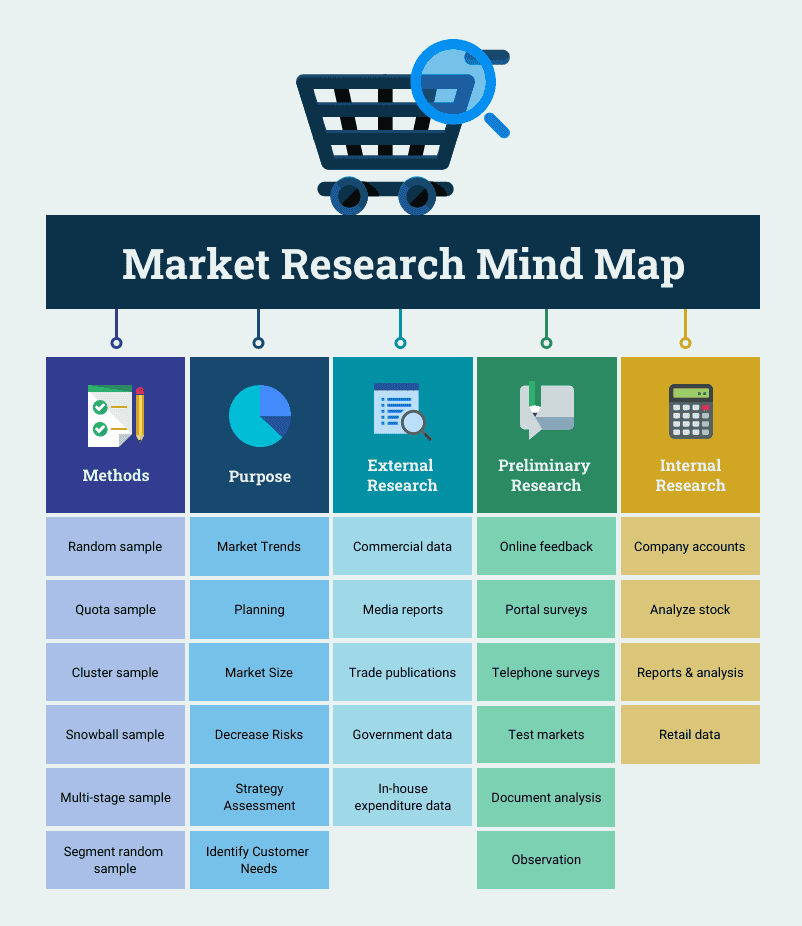Updated on 17th of February.
It's critical to learn about the companies that operate in your niche when you're first studying a market. It's also crucial to know how these companies got on the list of top industry players and what marketing methods they employ. You should also look into the qualities and preferences of your target audience, regional potential, competition offerings, and overall market dynamics. The question is, how will you manage it all?
Market research is the way to go!
What Is Market Research
Market research is the process of actively surveying potential customers to determine the viability of a new service or product. Market research enables a startup or a business to identify its target market and obtain comments and other input from customers about their interest in a product or service.
This type of research can be done in-house, by the company, or by a market research firm that specialises in the field. Surveys, product testing, and focus groups can all be used to accomplish this. For their time, test subjects are frequently provided with product samples and/or a small stipend. Market research is an important part of a new product's research and development (R&D).

Steps To Market Research For Startups
Most entrepreneurs prefer to look at other small firms before starting their own. When you consider companies who are just getting started (as they are), have similar expenditures and don't have a lot of brand awareness, it seems obvious. The founders expect that it will help them surpass their nearest competitors in terms of strategies — and it does, at some point.
It may be more useful for startups to expand their horizons by studying successful businesses' best practices. Studying their experiences can help you save time and resources while getting you closer to the ambitious target you've set.
Define The Purpose For Your Market Research
Market research for startups, like any other firm, should begin with a list of the companies you'll be looking at.
It's important to keep in mind that the list you create will evolve. The companies you look up to when undertaking pre-launch research may not be the same as the companies you pick to monitor competitors on a regular basis in the future.
Do you want to do internal research to figure out what's going on? As a result, you'll be able to devise a more effective strategy for the future. On the other hand, you may concentrate on external research to determine the market's drivers and barriers?
Internal marketing research is mostly conducted with the goal of increasing sales and income. This analysis focuses on previous experiences in order to lessen the risks associated with future actions. On the other hand, external marketing research is concerned with the analysis of the environment and market where you operate your business.
While it's critical to understand market prospects and your company's strengths, it's maybe even more critical to be aware of potential threats and entry barriers. These may include the following:
- New entrants and companies and other startups that may offer similar or substitute products or services to yours
- Local players that you might not be aware of if you're looking at the competition from a global standpoint
- Cultural differences, language barriers, and logistical challenges
- Reveal the market's overall trends and averages, and compare them to the dynamics of the strongest rival.
Analyze Your Market Audience
For startups, market research entails more than just gathering competitive information. For a better knowledge of client wants and preferences, target audience assessment, market segmentation, and opportunity analysis are essential. In this manner, you'll be able to come up with a unique idea that will appeal to your target audience. You can:
- Estimate the total market size and potential. Pay attention to the volume of web traffic generated by the major players. Will the same amount of unique visitors (possible consumers) on your website be sufficient for your business in terms of leads? Take the rate of traffic increase into consideration as well. How much time (and effort) do you think it would take you to achieve the same number of users?
- Competitors' target audiences, including their demographics and interests. Before beginning your own business, you must have thoroughly researched your target market so that you are certain in who you should target. However, it's never a bad idea to look into the types of customers your competitors are already drawing. What are the typical interests, ages, and genders of your target market? Is there a demographic you haven't considered as a lucrative target? Or will you have to consider reaching out to a somewhat different audience in order to stand out?
- Understand audience behaviour and preference. Who do you want to reach out to? What type of customer do you want to attract? Any business that does not conduct due diligence on potential customers is doomed to fail. If you want to draw people's attention, you must first learn more about them. Any company's principal goal is to gain loyal clients. The rate of return will grow as a result of these clients. You should pay attention to the personalities, preferences, and interests of your customers to keep them loyal to your company and optimize your sales.
Product and Digital Marketing Strategies and Tactics of Top Companies
Determine your competitors' strengths and shortcomings by analysing their business activity. To conduct efficient marketing research, you must also employ various analytic tools and analytics. Try to pick the best tools that will help you the most throughout the procedure.
- Shortlist top companies for comparison. It is recommended that you narrow your choice of well-known competitors to the top five contenders. Five — because this is the most realistic (and frequent) number of competitors that a company can keep track of on a regular basis. Strongest – because if you want to figure out which techniques work best for startups, you should look at companies who have already achieved some progress. Only if you're looking for average results are moderate companies worth your time.
- Find the optimum marketing mix. Find out what unique strategies (if any) your top online competitors employed to rise above the competition. This is in terms of your marketing mix (your product, price, place and promotional strategies). The top competitors you are tracking have already attempted a variety of product development and marketing strategies, which you are unlikely to have. Simply studying their Top Pages will reveal their best approaches and strategies in online and traditional marketing mix.
- Identify gaps and limitations. Make notes during your market research, it will result in a list of gaps and possible solutions. In highly dynamic industries, quick reaction and innovative actions are essential for startups, as there is no time for mistakes. This means that every marketing and business choice should be based on solid facts, and competitor analysis is one of the most important aspects of efficient public relations.
Importance of Market Research
Startup companies who invest time and resources in high-quality market research before launching their first product obtain significant information that can be used to identify needs, establish relationships, and predict change, all of which improves their prospects of becoming market leaders.
- Identifies Market Need. A product must fulfil customer requirement and needs. Consumers will not purchase something if they do not require it. Collecting data on the existing market landscape, including its size, trends, and other forces (such as governmental and social policies and customer preferences) that affect it, aids new businesses in fine-tuning their offering(s) for optimum ROI.
- Pick The Ideal Location. The most clients are attracted to a firm that has high customer reachability. As more and more firms open up shop in the locations most frequently visited by their intended clients, a central location frequently emerges. They follow the customers, and the customers follow the businesses, focusing both on a certain niche. Market research literally pinpoints existing businesses with subsequent analysis determining whether or not it would be profitable for a company to set down roots there, as well.
- Reveal Competition and Strategies to Battle. In addition to recording competitors' geographical locations, market research can reveal competitors' market positions. Everything from product design and delivery to marketing and price is affected by market saturation. Investigating what others are selling and doing can reveal any gaps in supply and demand, allowing new businesses to better exploit them.
- Understand and Evolve Marketing Practices. Companies devote a significant amount of time and money to their advertising and marketing efforts. For startups, market research is essential because it allows them to decide the type of marketing strategy that will reach and resonate with the most people in their target demographic. They can then allocate their funds in such a way that their choices are supported.
Examples of Market Research for Startups
There are many ways that startups and businesses can conduct market research. Below mentioned are some of the most popular and effective means to conduct market research:
- Surveys. Questioning the target audience is a means of acquiring information. Because of the variety of possible question types and options, surveys are the most versatile and widely used.
- Interviews. This type of market research is more personal, as it allows for more in-depth investigation and lengthy dialogue and explanation.
- Focus Groups. This usually entails a group of individuals meeting in a room to discuss a specific topic. There's also an organiser who keeps track of the conversation using the checklist questions and tries to get some insights. Although this is a basic notion, it can be difficult to carry out well.
- Social Media. Because of the vast amount of information available on social media, this strategy is very useful. Because such information is unedited and spontaneous, you may be confident that it reflects exactly what a person cares about.
- Observation. This method of research is well-known. It entails observing members of the target audience in their natural habitat (for example, video recording in a shop). Observation includes noting their spending habits, understanding customer tastes and preferences for new product development and/or marketing planning.
Advantages and Disadvantages of Market Research
There are a few advantages, as well as disadvantages of market research here for your reference:
| Advantages | Disadvantages |
|---|---|
| Easy detection of market problems and opportunities | Market research takes time |
| Helps in marketing strategies formulation | Research is expensive |
| Understanding of customer's needs | Inaccurate information |
Easy detection of market problems and opportunities:
The first and most important advantage of marketing research is that it provides comprehensive market knowledge. It provides information on the product's marketing potential, which determine its success or failure. Apart from that, it assists in determining the competitive nature of the market, whether consumers are pleased or not, the company's sales level and the channel of distribution employed.
Helps in marketing strategies formulation
Doing company today is a challenging endeavour since it necessitates extensive marketing research and information acquisition. Furthermore, today's company is performed not only on a local level but also on a worldwide level, which necessitates the onerous work of managing a huge number of clients and diverse distribution channels. Above all, predicting people's demands is a challenging endeavour. Marketing intelligence acquired via marketing research aids in the simple creation and implementation of pre-determined plans.
Understanding of customer's needs
Because the success of every firm today is dependent on its consumers, marketing operations are now customer-focused. Marketing research plays an important role in gathering information on client desires, which aids in the design of products to meet the needs and desires of customers.
On the other hand, here are the disadvantages of market research:
Market research takes time
It takes time to analyse new trends and fashion in the market. Market research might often fail to analyse trends, resulting in a bad response for the organisation.
Research is expensive
Market research is a costly procedure; it takes time and a lot of money to analyse new market trends.
Inaccurate information
Fashion and trends fluctuate throughout the day and night in the modern day. As a result, market research fails to comprehend industry fashion and trends.
Conclusion
Before entering a new market, it is vital to conduct an extensive study. To research the market for your startup, you'll need both time and money. As a result, it's critical to ensure that the data you've gathered may be used in your project.
If you're a small firm or a startup, conducting thorough market research is critical for planning your digital marketing tactics and making subsequent decisions. Before investing time and money in your business, it makes sense to obtain knowledge about the industry, rivals, and target audience.
Market research for startups should always be based on reliable and authoritative data that accurately reflects the real-world scenario rather than someone's idea. Any potential investor will undoubtedly inquire about the data's origins. In any case, this is about your company and your ambitions.
References
Steps To Market Research for Startups
Market Research: Need, Advantages and Disadvantages






